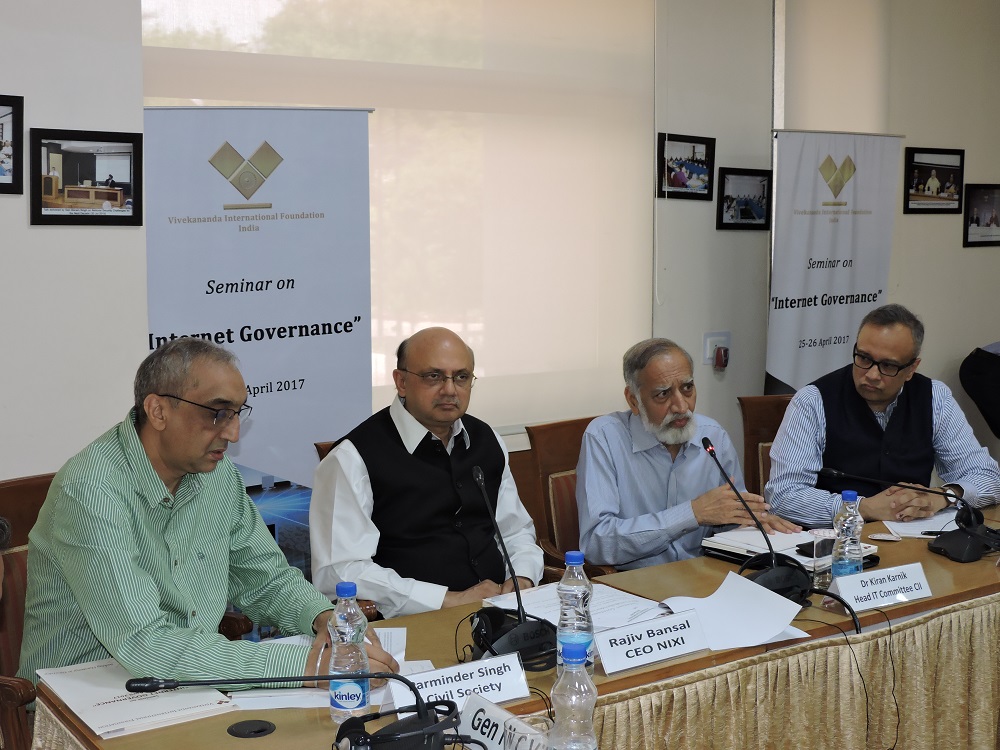Shri Ravi Shankar Prasad, Hon’ble Minister of Information Technology (IT), Electronics, and Law & Justice, Government of India, Ms. Aruna Sundararajan, Secretary, Ministry of Electronics and Information Technology (MEIT), Dr. Gulshan Rai, National Cyber Security Coordinator (NCSC) in the Prime Minister’s Office and Dr. V K Saraswat, Member NITI Ayog, among other luminaries including heads of IT companies, techno-legal experts, and members of academia, think tanks and the civil society, joined for a two-day national conference on ‘Internet Governance’, at the Vivekananda International Foundation (VIF) on 25 & 26 April 2017.
The conference was a forum to discuss India’s increasing dependence on the Internet, for the Government to use digital platforms to execute programmes and services accessible to the public. Massive build up of critical infrastructure, support networks, upgrade of technologies, policies and legal frameworks and such requirements of Internet governanace. The conference comes close on the heels of the first global Internet summit ‘ICANN 57’ (Internet Corporation of Assigned Names and Numbers) held last November in Hyderabad since the US government ceded control over the fundamental domain. Incidentally, while ICANN 57 marked India’s first official endorsement of a bottom-up or ‘Multi-stakeholder’ model of Internet governance, this conference aimed at evolving strategies for subsequent discussions at various global Internet forums.

The significance of the Conference can be gauged from the fact that while businesses around the world are pushing the boundaries of technology, policies which affect them are being developed by the multi-stakeholder model at forums such as IGF, ICANN, IETF and Internet Society. It is therefore increasingly important that Indian stakeholders identify that part of the model which is relevant to them and participate in the decision-making processes at various Internet forums globally. This requires charting a coherent stance on issues of technical governance and Internet public policy, harmonized across all levels of governance and avenues of diplomacy.
The Conference, witnessed participation from all the important Indian stakeholders, extended over five technical sessions besides the inaugural session. In the Inaugural Session, General NC Vij, Director, VIF, dwelt briefly on the main theme of the seminar while welcoming the guest speakers. An environment scan was then provided by Dr. Gulshan Rai, regarding usage of Internet and mobile phones for inclusive development and availability of various services to the people at the bottom of the pyramid.

The Hon’ble Minister, while delivering the Keynote address, conveyed the political will for absolute necessity of digital transformation taking place in the country and emphasized that as a matter of government policy, India must not miss the digital revolution. He deliberated at length from the vision of Digital India, Smart Cities, Bharat Net, extension of services through common service centers being available at each village and associated job creation, among other projects. He also dwelt on the AADHAR card and its link up with bank accounts for direct transfer of funds, apprehensions regarding privacy and possible misuse of individual information and saving to the government a sum of Rs 50,000 crore by correct application and implementation of data. While emphasizing the economic potential of data, the Hon’ble Minister exhorted the participants to suggest a security framework for data and how to create an eco-system for data-protection, data-privacy, data-sharing, data-integrity and so on.

Ms Aruna Sundarajan, Secretary IT, talked about Digital Economy. She stressed that physical economy is a subset of digital economy and that is where India is going. Among other points she made, there is a need for an informal exchange of trade facilitation as also a framework for consumer protection. She however underlined the importance and need for cyber security and also the need for synergies among the stakeholders. Most importantly, she focused her talk on making multi-stakeholderism work, making it more inclusive, finding ways and means of enhancing India’s voice at global discussions on Internet governance and maximizing local contributions to the value chain, among other things.

The First Session of the Conference dealt with strategy and policy. It noted, among other things, that India is the second largest market of Internet after China. With the flow of Internet increasingly gravitating towards Asia, it is pertinent that India position herself at the center of global discussions on the future model of Internet governance while creating space for an Indian vision of the Internet as an inclusive, democratic and equitable global common. It also highlighted that the stance India takes on the future model of Internet governance, especially at multilateral forums, will be watched closely by other nations. The session focused squarely on the Indian vision for Internet governance, Institutions and Actors, Strategic Engagement with Key Stakeholders, Mapping for a for Strategic Engagement, among other relevant issues.

The Second Session touched on Legal Aspects of Policy Design. Discussions were held broadly in light of glaring absence of overarching international legal framework, especially the absence of a compliance regime to checkmate Internet-borne crimes such as terrorism, money laundering etc. It was particularly highlighted that applying principles of public international law to cyberspace is a daunting challenge, given the multiplicity of platforms and organisations regulating the cyberspace. Preserving the global nature of cyberspace whilst respecting national laws however presents an acute issue for Internet governance discussions. Jurisdiction over cross-border crimes, human rights as applicable to Internet governance, Net Neutrality and legal approaches to cybercrimes emanating from third countries were a few amongst issues discussed during this session.

The Third Session focused on issues related to Technology, Trade and Economy. Among other things, it highlighted that India represents the largest potential market for global technology companies and hosts the next generation of entrepreneurs that could dominate global Internet markets in the future. India must leverage these factors to move beyond her current role of being a ‘price-taker’ and become a leader in multi-lateral and bi-lateral trade negotiations. However, envisioning a consistent Indian digital trade policy, that addresses issues of consumer protection, market access and fair competition from the standpoint of the Indian Internet ecosystem, is required. At another level, it is imperative that Internet governance discussions include the perspectives of different nations, especially India’s, with different historical contexts, differing levels of Internet access and speeds, and technological progress. Discussions generally revolved around issues like the Internet protocols, internationalized domain names or Indian language support within technical standards, the Indian vision of global digital trade, taxation and revenue frameworks for Digital Economy etc.

Security occupied the center stage during deliberations at the Fourth Session. It emerged from the discussions that threats to cyber security have evolved exponentially concurrently with the expansion of Internet. Cyber criminals and terrorists, tucked away in a remote third country, can potentially devastate a country’s economy and endanger public safety without any fear of retribution. Deliberations underlined that a global framework of trust, predictability and continuity must be built to safeguard Internet infrastructure against asymmetric borderless crimes at the cutting edge of technology. With India driving to a less-cash driven economy, safeguarding India’s critical financial infrastructures becomes even more paramount. Recognizing the security issues on India’s Digital Economy, discussions broadly focused on the role of government in cyber security, critical Internet resources, supply chain security, privacy and ethics challenges, among other issues.

The crux of the two-day conference however lay in the Fifth Session, devoted to ‘Multi-stakeholderism in Action’. Deliberations in this session underscored that India, going forward with a multilateral model of Internet Governance, must craft a unified and consistent stance that can lend weight to her contributions at the global forums. She must identify and create opportunities to exert greater ownership over Internet infrastructure, to create a digitally self-sufficient eco-system for her population, and encourage greater international engagement from Indian stakeholders as well. To these ends, the deliberations focused on increasing industry and MSMEs participation in Internet governance, identifying opportunities for Indian industry into Internet infrastructure, creating a domestic space for industry and stakeholder engagement in India, among other things.

In the Concluding Session, Lt Gen Davinder Singh presented a recap of the main proceedings of the seminar, while Dr. Gulshan Rai presented before the audience his own impression of the whole conference. Dr VK Saraswat, Member NITI Ayog, gave the valedictory address, highlighting the importance of Internet governance from a perspective of E-governance. Shri Saikat Dutta, Centre for Internet & Society, Shri Pawan Duggal, Advocate, Supreme Court of India, Dr S K Agarwal, Dy. Director, NSCS, Shri Sanjay Kumar Verma, JS, MEA (EG&IT, GCI), Shri R Chandrasekhar, NASSCOM, Dr Sanjay Bahl, DG, CERT-In, and Shri Samiran Gupta, Head India ICANN, were among other prominent panelists at the Conference.








